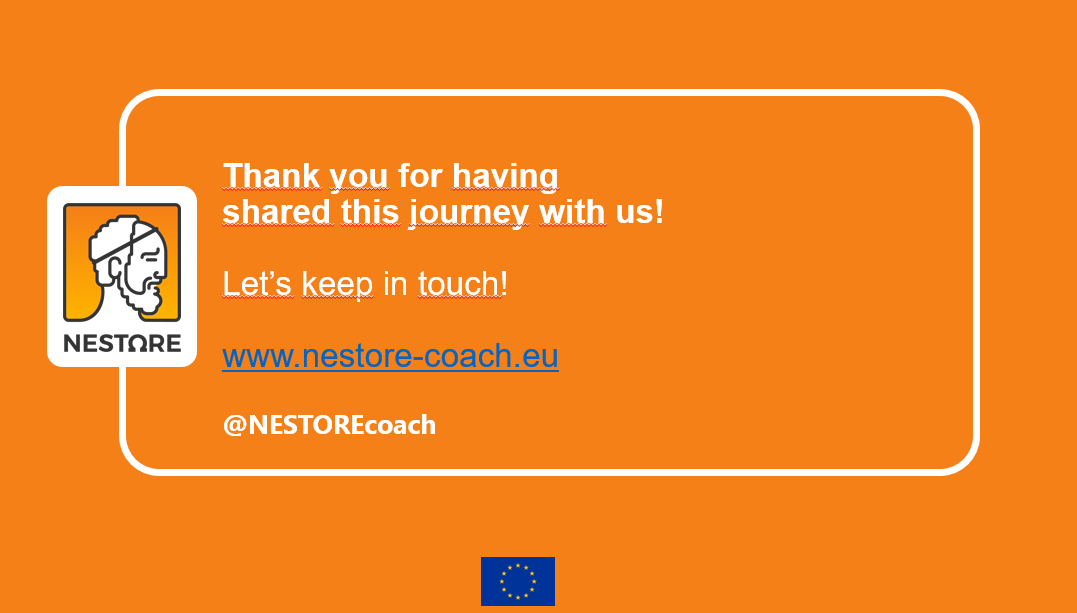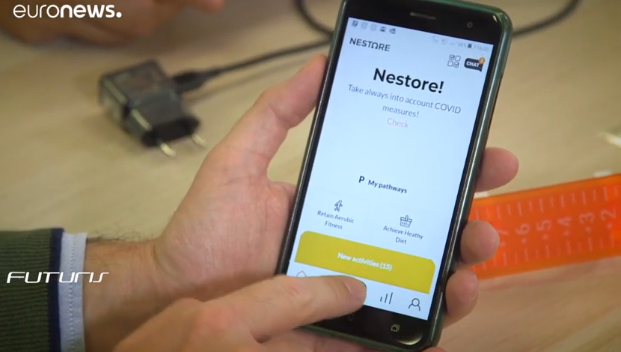
The end of the road, not the end of the journey!
“Difficult roads bring to wonderful destinations”
A 42-month-old journey comes to an end. The Horizon2020 project NESTORE, funded to deliver a prototype for a virtual coach to motivate healthy and active habits for better well-being, virtually met many of its stakeholders during an on-line final workshop on 25 February 2021.
Over 90 attendees explored and discussed the project’s challenges and lessons learnt in co-design, technological development, pilot organization and implementation, and exploitation. Exchanges brought vCARE, CAPTAIN and Council of Coaches, fellow research projects, to share their finding and legacy. The event also allowed the European Commission to dive into its strategies supporting digital solutions for ageing well, including the Green Paper on Ageing and the European Health Data Space.
To manage expectations, complexity and fragmentation in the user experience and technologies in such a multi-dimensional project was no easy task. As the NESTORE Scientific Coordinator reminds, “life is an extraordinary travel, getting older is sometimes an Odyssey…” but NESTORE tried to indicate the right pathway. Its approach was to contribute to well-being in older age with good teamwork, overcoming a world-wide pandemic, and supporting with ongoing efforts to a paradigm shift, bringing prevention at the center. NESTORE emphasized that each of us can act towards our own well-being, by empowering the users with some friendly and useful digital solutions sustaining one’s motivation to remain healthy and active, especially when a boost is needed.
The consortium wished the journey could have been much longer. That could have offered the opportunity to strengthen the co-design results, to run a validation study on a larger sample and to raise more awareness around reimbursement issues and innovative services, which require innovative business models and policies.
But this can be part of a next journey.
Here below the presentations displayed at the final event:
Introduction, by Giuseppe Andreoni
Presentation from DG CONNECT, by Irina Kalderon-Libal
Presentation from DG SANTE, by Ander Elustondo Jauregui (PPT not disclosable)
Challenges and lessons learnt from co-design, by Paul Chamberlain
Challenges and lessons learnt from technology, by Ciprian Candea
Challenges and lessons learnt from user experiences, by Laura Fernandez
Challenges and lessons learnt from exploitation, by Emanuele Lettieri
Spotlight on vCARE, by Massimo Caprino
Spotlight on CAPTAIN, by Evdokimos Konstantinidis
Spotlight on Council of Coaches, by Harm op den Akker
Final conclusions, by Cinzia Mambretti, Ilenia Gheno, Giuseppe Andreoni
For information, please find also the press releases after the event, in its English and Italian versions.
What follows is the registration of the event. The presentation from DG SANTE has been cut as not disclosable.



